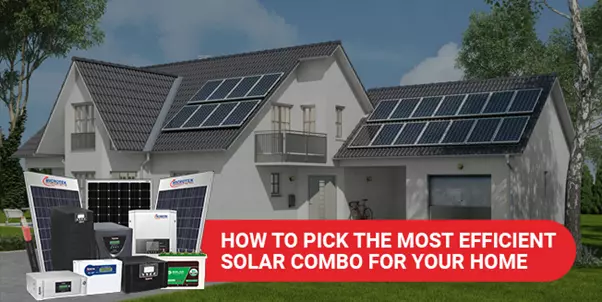
August 14 , 2021

Regardless of whether you are hoping to evade annoying everyday power cuts or are simply looking for an escape plan to bring down your utility bill, solar combos are the ideal solution. They are known as a smart financial investment that provides its users with an uninterrupted power supply when they most need it. With the current Covid-19 situation, another vital benefit of solar combos is that they are good for our environment, thus making them the perfect energy solution of the present and for years to come.
Assuming you need one of those, you have landed at the right place. In this blog, we explicate comprehensively how you can invest your resources in buying the best solar combo for your domestic use.
Power Requirement
Power requirement is the simple evaluation or the sum of the power, which you require to run all the appliances and/or equipment during a power cut. First and foremost, it is important that you determine what all you need and want to be running when there is no power, for instance: you must know from all the things that work on electricity- refrigerator, TV, lights, fans, etc.
Following are a few steps that will help you in assessing your daily power needs.
A quick example, which will make the above calculations clear:
| Equipment | Power rating in Watts | Number | Load | Duty Cycle in Hours | Daily Energy Consumption watt hours |
| TV | 100 | 1 | 100 | 2 | 200 |
| Fan | 60 | 3 | 180 | 2 | 360 |
| LED | 10 | 2 | 20 | 2 | 40 |
| Tube Lights | 40 | 3 | 120 | 2 | 240 |
| Total Load | 420 | 840 |
Using the above table format, you can make ‘N’ combinations and calculations.
To begin with, let us comprehend the UPS rating.
As mentioned in the Step 2 (above) UPS VA rating = Total load (420) x 1.67 = 701.4 VA.
So, you can conclude that a 750 VA UPS will be perfect for your daily energy requirements.
With an 750VA solar UPS, you can sustenancea current rating of 30 amperes and 12 V of battery voltage.
Therefore, Battery Amp hour (AH)= (1.9X Total daily Watt-Hours) divided by (Number of batteriesX12) = (840*1.9)/12*1 = 133 AH.
This concludes that you must select a 133 AH size solar battery.
Similarly, we can easily find out the panel size by dividing the daily energy requirement in Watt-Hours by 3.
Taking readings from our example, the needed panel size would come out to be 840/3 = 280 W.
Since, the Solar UPS can support a system of 12V, you need panels of 12V with a power of 150 or at least 100-Watt Peak (Wp).
And to achieve this, you are required to install either 2 panels of 150 Wp or 3 panels of 100 Wp in parallel.
The next in line is to select the type of inverter, which will be best fit for your needs. It is important to choose them wisely because they are the one responsible for transforming the DC produce of the solar panels into functional AC. Inverters are available in two types: Module level power electronics, also known as the MLPEs and the string inverters. If you live at a place that sees optimal sunlight, it is ok to go for string inverters, as they are the cost-effective option. But if you want best of efficiency and are ready to spend a little more, you must choose MLPEs, which are smart and updated ones.
Selecting the right company to mountall these devices is a vital step. Before picking the one, you must study their track record, certifications, reputation, and whether or not they have the required permissions and licenses for the services they are offering.
Talking about the efficiency of the solar panel, the industry normal is 16-18%. And in terms of average warranty period, it is 10-25 years. It is important that you select the solar combo that goes well with these two parameters.
When it comes to the efficiency of the solar panel, the industry average is 15-18%. Also, the industry average in terms of product warranty is 10-25 years. Confirm in advance that the solar combo you are selecting has efficiency and warrantyas per the industry standards. In addition, you must also know about the durability factor, the manufacturers reputation and the overall lifespan of the product.
Conclusion
Reading the above information, we are sure that you have understood all the concepts and criterion that goes behind the selection of that perfect solar combo. We are sure that with this information, you will confidently go ahead and select the best items from our product range. With Microtek, you can rest assured that you will get the best product in best price.